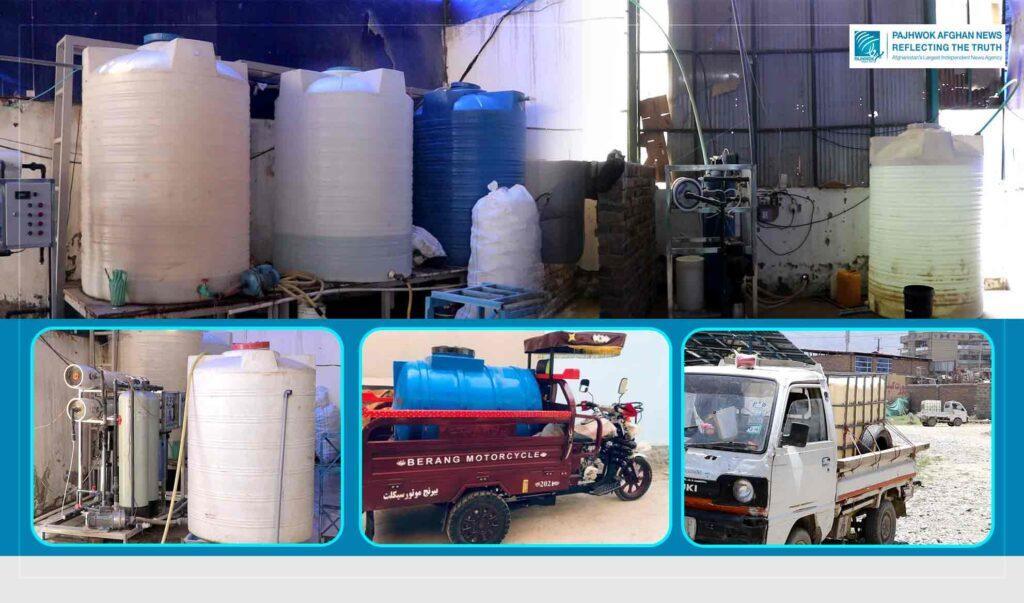Concerns Rise Over Water Tankers In Kabul As Groundwater Levels Fall
KABUL (Pajhwok): With groundwater levels in the central capital Kabul plummeting unprecedentedly, many residents are currently relying on mobile tankers for drinking water.
Experts warn that while tankers may provide short-term relief, the practice could further deplete underground reserves if a sustainable solution is not found.
Meanwhile, the Ministry of Energy and Water (MoEW) says it has launched the process of legalising such firms, with 200 already registered.
The ministry has advised suppliers to use surface water or obtain water from sources outside the city.
Public dependence on tankers
Several Kabul residents told Pajhwok Afghan News they had no access to piped water and were forced to purchase their drinking water from tankers, despite the high prices.
Abdullah, an inhabitant of 12th police district in Ahmad Shah Bana Mina, said:“Water is a blessing from Allah (SWT), but the purified and mineral water sold by companies, particularly through tankers, both healthy and tasty.”
He explained that although his home had water, its quality was poor, so he bought purified water from tankers, often around 20 litres a day.
Another resident, Akmal from Husainkhel area, said:“We do have water in our home, but it tastes bad and is contaminated. That's why we purchase water from tankers and use that instead.”
Where does the water come from?
Mohammad Faheem Ata, deputy head of the Kabul Mineral Water Companies Union and owner of a water firm in the 12th police district of Ahmad Shah Baba Mina, said they produce two types of water tanker-supplied and bottled.
He said tankers and motor tricycles deliver water door to door, selling it at one afghani per litre.
“We supply between 15,000 and 20,000 litres of tanker water daily to the market, along with 1,500 to 2,000 packs of bottled water,” he added.
According to Ata, while they initially sourced water from other areas, they now extract it directly through boreholes at company sites, purity it and sell it in the market.
He recalled that last year alone, 43 small companies distributing only tanker water were registered in the 12th police district, but now most had drilled boreholes to extract their own groundwater.
He said his firm held a municipal licence for tanker and a separate licence from the Ministry of Industry and Commerce (MoIC) and Intellectual Property for bottled water.
Two years ago, his union surveyed Kabul and recorded around 250 to 300 medium-sized companies selling water through tankers.
“It has now been two years since that survey, so the number may have increased or decreased,” he added.
Samiullah Ahmadzai, a driver for a water company, said that he distributed water daily by a Suzuki-type vehicle, selling it at one afghani per litre.
“Sales are good, as in many areas people cannot drink the piped water due to poor taste and contamination,” he said.
Experts warn of long-term risks
Dr. Mohammad Dawood Shirzad, dean of Kabul University's Faculty of Environmental Sciences, said companies were over-extracting the city's groundwater and even transporting it to other areas, which posed a“deeply worrying” risk.
He warned:“Even if we have a normal year with good rainfall and snowfall, the water balance will still be negative because Kabul has expanded into areas that once absorbed rain and snowmelt to replenish underground reserves.”
He suggested water bottling factories should instead be established near rivers where surface water was plentiful, to avoid further depleting groundwater.
Similarly, water affairs analyst Nazim Samoon said some wells in Kabul had already dried up, forcing residents to rely on tankers.
“This is not a sustainable solution, as these companies also draw water from underground reserves, which will eventually run out,” he cautioned.
Samoon added that the crisis had created opportunities for profiteering, with some suppliers selling unsafe water.
“Unless a fundamental solution is found, such as bringing water through pipelines from previously studied external sources, Kabul's water crisis will only deepen,” he warned.
Water and environmental expert Najibullah Sadid said private water companies had emerged to fill the gap left by Kabul's inadequate piped supply. While appearing useful is the short term, he warned they posed serious long-term risks.
“Most of these firms extract water from deep boreholes, which ordinary citizens cannot afford to drill, thus monopolising a public resource. Ultimately, they cannot meet the needs of Kabul's population, and urgent measures must be taken to ensure safe and quality water for residents,” Sadid stressed.
Government action & international concerns
Qari Matiullah Abid, spokesman for MoEW, said that since re-establishment of the Islamic Emirate of Afghanistan (IEA), efforts had been underway to regulate water supply companies. So far, 200 firms have been legalised, with the process ongoing.
He said companies had been instructed to obtain water from outside Kabul where possible, purity it and then deliver to the residents.
“Some companies still rely on groundwater inside the city, but the Office of the Prime Minister for Economic Affairs has prepared a draft plan to ensure all operate according to regulations,” he added.
He said ministry teams regularly monitor registered companies to ensure compliance, while restrictions had also been imposed on large consumers such as factories, high-rise buildings and car washes, which were required to install water management and recycling systems.
Abid warned:“Excessive reliance on groundwater could create serious problems. Consumers must use surface water where possible and exercise restraint”.
Earlier this year, the ministry reported that water levels had dropped by up to 90 percent in some river basins, while central provinces were also suffering drought.
The UN Assistance Mission in Afghanistan (UNAMA) said in June that nearly one-third of Afghans still lacked access to safe drinking water, with over 10 million people using unsafe sources.
It added that the crisis hit rural women and children particularly hard.
The European Union (EU) office in Afghanistan has also voiced concern over dwindling water sources, especially in Kabul, warning of impacts across all aspects of life.
The EU said it stood ready to support Afghan partners in addressing the crisis.
kk/ma

Legal Disclaimer:
MENAFN provides the
information “as is” without warranty of any kind. We do not accept
any responsibility or liability for the accuracy, content, images,
videos, licenses, completeness, legality, or reliability of the information
contained in this article. If you have any complaints or copyright
issues related to this article, kindly contact the provider above.
Most popular stories
Market Research

- Kucoin Presents Kumining: Embodying Simple Mining, Smart Gains For Effortless Crypto Accumulation
- 1Inch Becomes First Swap Provider Relaunched On OKX Wallet
- Cregis Joins TOKEN2049 Singapore 2025
- Leverage Shares Launches First 3X Single-Stock Etps On HOOD, HIMS, UNH And Others
- Blockchainfx Raises $7.24M In Presale As First Multi-Asset Super App Connecting Crypto, Stocks, And Forex Goes Live In Beta
- BILLY 'The Mascot Of BASE' Is Now Trading Live On BASE Chain






















Comments
No comment